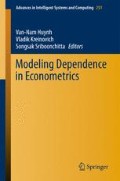Abstract
Market interdependence has always been an interesting topic in the study of tourism demand. China, Japan, and Korea are important tourist markets for Thailand tourism. Understanding how the arrivals relate to each other can help in tourism management, in a way that it prepares the tourism industry to plan for the risk management of the tourism demand and tourism supply. The vine copula model was used to analyze the multiple dependencies by decomposing the diversity of the paircopulas which can be arranged and analyzed in a tree structure. For this study, both the C-vine copula and the D-vine copula were used to answer the research question. We give the same conditioning variable for both the C-vine and the D-vine copula models in order to find the answer to our question of whether these two models would give different results. The contributions of the study are obtained from the findings. The C-vine and D-vine copulas provided three pair-copulas, namely, China-Korea, China-Japan, and Korea-Japan given China and there exists a weak positive dependence in each pair. In addition, the results provide evidence that China has influence on the dependence between the tourist arrivals from Korea and Japan. Moreover, the three dimensions of the C-vine and D-vine copula models, which are given the same conditioning variable in the second tree, optimally provide the same estimates of the parameters of interest.
Access this chapter
Tax calculation will be finalised at checkout
Purchases are for personal use only
Preview
Unable to display preview. Download preview PDF.
References
Department of Tourism, Thailand. Tourist Arrivals in Thailand (2012), http://www.tourism.go.th/tourism/th/home/tourism.php (accessed December 20, 2012)
World Bank. China 2030: Building a Modern, Harmonious, and Creative High-Income Society [pre-publication version]. World Bank, Washington, DC (2012), https://openknowledge.worldbank.org/handle/10986/6057 (accessed February 21, 2013)
Goh, C.: Exploring impact of climate on tourism demand. Annals of Tourism Research 39(4), 1859–1883 (2012)
Vanhove, N.: The Economics of Tourism Destinations, 2nd edn. Elsevier, Ltd., London (2011)
Lean, H.H., Smyth, R.: Asian Financial Crisis, Avian Flu and TerroristThreats: Are Shocks to Malaysian Tourist Arrivals Permanent or Transitory? Asia Pacific Journal of Tourism Research 14(3), 301–321 (2009)
Schirmacher, D., Schirmacher, E.: Multivariate Dependence Modeling using Pair- copulas. Technical report, Society of Acturaries: 2008 Enterprise Risk Management Symposium, Chicago, April 14-16 (2008), http://www.ermsymposium.org/2008/pdf/papers/Schirmacher.pdf (access March 10, 2013)
Allen, D.E., et al.: Financial Dependence Analysis: Applications of Vine Copulae. Unpublished Discussion paper, Tinbergen Institute Amsterdam Netherlands (2013), http://papers.tinbergen.nl/13022.pdf (accessed March 10, 2013)
Sriboonchitta, S., et al.: Modeling volatility and dependency of agricultural price and production indices of Thailand: Static versus time-varying copulas. International Journal of Approximate Reasoning 54(6), 793–808 (2013)
Joe, H.: Multivariate Models and Dependence Concepts. Chapman and Hall, London (1997)
Nelson, R.B.: An Introduction to Copulas, 2nd edn. Springer, New York (2006)
Joe, H.: Families of m-Variate Distributions with Given Margins and m(m1)/2 Bivariate Dependence Parameters. In: Rüschendorf, L., Schweizer, B., Taylor, M.D. (eds.) Distributions with Fixed Marginals and Related Topics, vol. 28, pp. 120–141 (1996)
Bedford, T., Cooke, R.M.: Probability Density Decomposition for Conditionally Dependent Random Variables Modeled by Vines. Annals of Mathematics and Artificial Intelligence 32, 245–268 (2001)
Bedford, T., Cooke, R.M.: Vines- A New Graphical Model for Dependent Random Variables. Annals of Statistics 30, 1031–1068 (2002)
Aas, K., et al.: Pair-copula constructions of multiple dependence. Insurance: Mathematics and Economics 44, 182–198 (2009)
Zimmer, D.M.: Analyzing Comovements in Housing Prices using Vine Copulas. Western Kentucky University (2013), http://people.wku.edu/david.zimmer/index_files/vine.pdf (access March 20, 2013)
Zhang, H., et al.: An integrated model of tourists’ time use and expenditure behaviour with self-selection based on a fully nested Archimedean copula function. Tourism Management 33, 1562–1573 (2012)
Liu, J., Sriboonchitta, S.: Analysis of Volatility and Dependence between the Tourist Arrivals from China to Thailand and Singapore: A Copula-Based GARCH Approach. In: Huynh, V.N., Kreinovich, V., Sriboonchitta, S., Suriya, K. (eds.) Uncertainty Analysis in Econometrics with Applications. AISC, vol. 200, pp. 285–296. Springer, Heidelberg (2013)
Bollerslev, T.: Generalized Autoregressive Conditional Heteroskedasticity. Journal of Econometrics 31, 307–327 (1986)
Brechmann, E.C., Schepsmeier, U.: Modeling Dependence with C- and D-Vine Copulas: The R Package CDVine. Journal of Statistical Software 52(3), 1–27 (2013)
Patton, A.J.: Modelling Asymmetric Exchange Rate Dependence. International Economic Review 47(2), 527–556 (2006)
Nelson, D.B.: Stationarity and persistence in the GARCH(1,1) model. Econometric Theory 6, 318–334 (1990)
Lee, S.W., Hansen, B.E.: Asymptotic theory for the GARCH(1,1) quasi-maximum likelihood estimator. Econometric Theory 10, 29–52 (1994)
Sklar, A.: Fonctions de répartition á n dimensions et leurs marges. Publications de l’Institut de Statistique de L’Université de Paris 8, 229–231 (1959)
Trivedi, P.K., Zimmer, D.M.: Copula Modeling: An Introduction for Practitioners. Foundations and Trends in Econometrics 1(1), 1–111 (2005)
Fisher, M.: Tailoring copula-based multivariate generalized hyperbolic secant distributions to financial return data: An empirical investigation. Discussion papers, University of Erlangen-Nüremberg, Germany (2003), http://www.statistik.wiso.uni-erlangen.de/forschung/d0047.pdf (accessed January 25, 2013)
Author information
Authors and Affiliations
Corresponding author
Editor information
Editors and Affiliations
Rights and permissions
Copyright information
© 2014 Springer International Publishing Switzerland
About this paper
Cite this paper
Puarattanaarunkorn, O., Sriboonchitta, S. (2014). Modeling Dependency in Tourist Arrivals to Thailand from China, Korea, and Japan Using Vine Copulas. In: Huynh, VN., Kreinovich, V., Sriboonchitta, S. (eds) Modeling Dependence in Econometrics. Advances in Intelligent Systems and Computing, vol 251. Springer, Cham. https://doi.org/10.1007/978-3-319-03395-2_24
Download citation
DOI: https://doi.org/10.1007/978-3-319-03395-2_24
Publisher Name: Springer, Cham
Print ISBN: 978-3-319-03394-5
Online ISBN: 978-3-319-03395-2
eBook Packages: EngineeringEngineering (R0)

